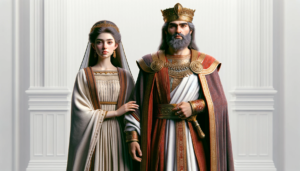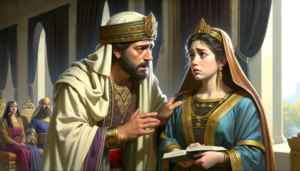
Esther’s Rise:
Esther’s rise to the position of queen is an event filled with ironies and twists. The narrative begins with a royal banquet and the subsequent dethronement of Queen Vashti, followed by the selection of Esther, who, despite her humble origins and concealed Jewish identity, captures the affection of King Xerxes.
This event is not just a tale of ascension to power but also a reflection of the social and political complexities of the time.
Style and Narrative:
The Book of Esther does not explicitly mention God or Jewish religious practices, which is notable considering its biblical context. This peculiarity suggests a narrative more focused on human actions and choices within a complex political and social environment.
The absence of direct mention of God can be seen as a reflection of Esther’s own dilemma, living in a world where divine presence is not immediately apparent, but where faith still plays a crucial role.

Esther and Mordecai: A Relationship of Guidance and Courage
Esther does not act alone. Her uncle, Mordecai, plays a crucial role in encouraging her to use her privileged position to intervene on behalf of her people. This relationship highlights the importance of community support and wise guidance in times of crisis.
Esther’s Dilemma: Between Personal Safety and the Fate of a People
The story reaches a climax when Esther faces the imminent genocide of her people. The decision to reveal her identity to the king is fraught with immense personal danger, illustrating a profound ethical conflict: the choice between personal safety and the well-being of her community.
Furthermore, the political context of the story is essential to understanding the gravity of Esther’s decision. The Persian Empire, one of the greatest powers of the time, was known for its rigidity and strict protocols, especially at the court. Queen Esther, by presenting herself before the king without being summoned, challenges not just the social norm but also risks her own life, as such an act could be seen as a grave offense.
Faith and Divine Providence in Esther’s Decision
Esther, in her decision, reflects a deep trust in divine providence. This part of the story is a powerful demonstration of active faith, where trust in God is combined with courageous and determined action, even in the face of great threats.
Moral and Ethical Implications of Esther’s Choice
Esther’s journey invites us to reflect on timeless moral dilemmas. How do we balance personal risk and community responsibility? Esther’s story challenges us to consider how our identities and beliefs influence our decisions in critical moments.

Contemporary Application: The Relevance of Esther Today
The courage and decisions of Esther transcend her time and context, offering valuable lessons for contemporary challenges. She inspires us to consider how we face our own moral dilemmas and how our faith and identity guide us in these choices.
Conclusion and Final Reflection
We conclude this article by contemplating the courage and unwavering faith of Esther. Her story is not just a tale of the past, but an active invitation to reflect on how we handle our own crises of identity and morality.
We ask you, our reader: How do your beliefs and identity influence your decisions in times of difficulty? How would you act in a situation similar to Esther’s?
Thank you for joining us in this deep and meaningful exploration. May the story of Esther continue to offer insights and inspiration on your personal and spiritual journey. See you in the next article of the series “Biblical Reflections and Moral Dilemmas”.
For more information, watch the video: Esther: Faith vs Personal Safety
See also: Abraham’s Choice: Hagar and Ishmael
